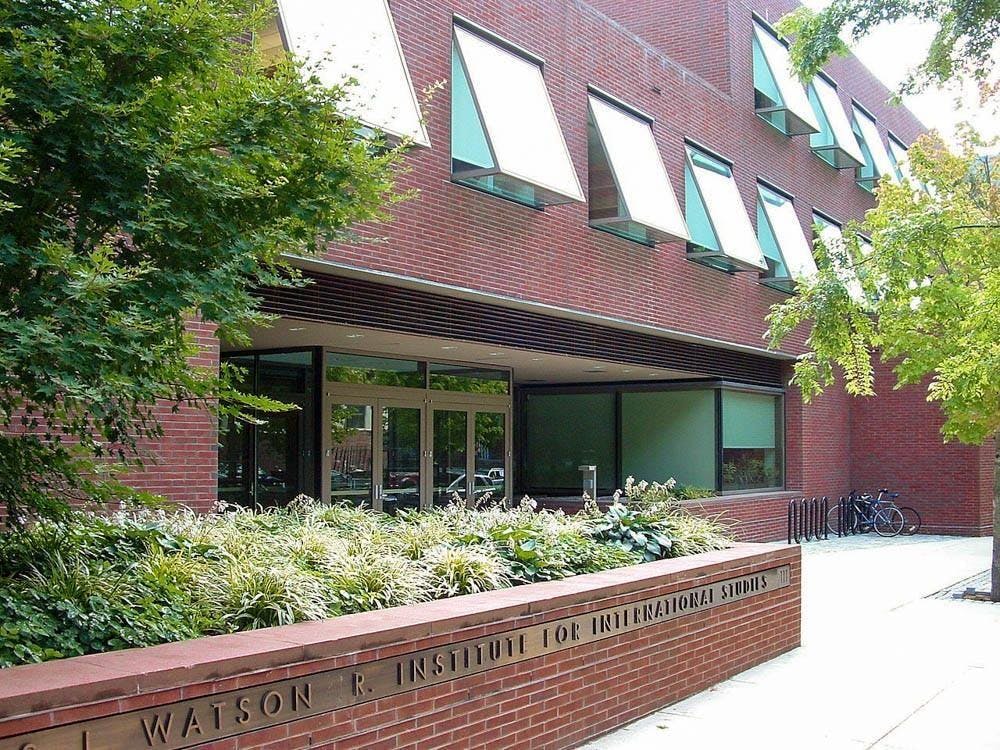Experts at a Tuesday panel discussion hosted by the Institute at Brown for Environment and Society and the Watson Institute for International and Public Affairs examined the role of climate issues in the upcoming 2024 presidential election.
The panel, titled “Climate Action and the 2024 Election: Science, Policy and Disinformation,” was moderated by Assistant Dean of Winter and Summer Undergraduate Programs Carrie Nordlund PhD’05, and featured IBES Director Kim Cobb. Other panelists included Christopher Rea, an assistant professor of sociology and international and public affairs, and Stefanie Friedhoff, the co-founder and co-director of the Information Futures Lab.
The discussion began with the subject of climate discourse, which both Democratic and Republican candidates have largely avoided. “On the Republican side there is sort of a soft denialism,” Rea said, while “on the Democratic side, there’s just very minimal engagement at all.”
When asked to imagine what environmental policy would look like depending on which presidential candidate won the election, Rea said that “there’s a big question mark on how aggressive the Harris-Walz administration would be on climate precisely because they’re not talking about it.” He added that if former President Donald Trump won in November, “climate activists will be caught on the back foot … There’ll be a lot of defensive work that needs to be done.”
Friedhoff added that the impacts of climate change need to be framed in terms of how they influence people in everyday life in order to engage more activism across the political spectrum.
“Storytelling is the number one tool to get people engaged at an emotional level,” Friedhoff said. “Science needs to be culturally authorized … Insisting that the science just knows and we need to act on it is the wrong way to make a policy.”
Panelists added that there is particular concern with the spread of disinformation. “Lying about the climate is part of a long history of business-driven interests when the science contradicts the business model,” Friedhoff said.
But Friedhoff noted that more people have begun to accept the realities of climate change. She explained that most people no longer ask, “Is this real or not?” The panelists referenced how many environment-related questions are now centered around how effective the solutions and ideas to mitigate climate change are.
Cobb highlighted the importance of action intended to bolster climate resilience — initiatives meant to prepare communities for the fallout of climate change. Climate resilience is especially important in the face of natural disasters like hurricanes, Cobb said, reminding policymakers that “the work of resilience needs to be centered in the discourse around climate at every level.”
One piece of historic legislation that has led to significant investment in climate resilience is the Inflation Reduction Act. “The private sector is leaning in, taking advantage of government subsidies and incentives to invest in our clean energy economy,” Cobb said.
The panelists touched on the country’s position in geopolitical climate conversations. Rea called the U.S. a “laggard” in climate action.
Cobb said China was the most serious competitor to the U.S in the race to implement climate action and clean energy. “We are behind the investments that China has already made and are going to continue to make,” she said, adding that America must improve its economic and national security positioning if it wants to catch up.
Ava Ward ’25 told The Herald that she has been “disappointed by the lack of discourse around climate in the media and in debate.” Ward enjoyed the professional diversity on the panel, noting that it was “great how they had a journalist, a sociologist and a hard climate scientist because climate change is such an interdisciplinary concern.”





